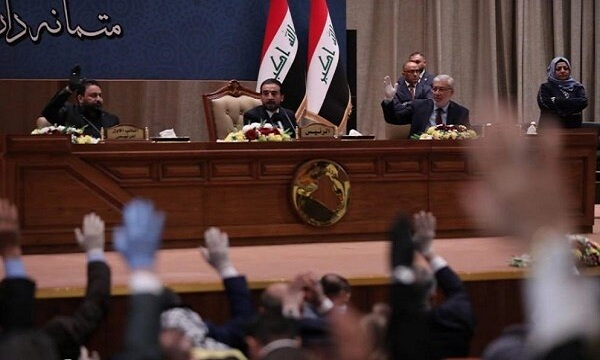Legislation of criminalization law in Iraq on relations with Zionist regime
Iraq is one of the important Arab and Islamic countries that has always been one of the Zionist regime’s target countries for establishing diplomatic relations and normalization of foreign relations due to its ideological characteristics, high geopolitical weight, potential economic capacities as well as special political and cultural atmosphere.
Iraq’s choice for normalization of bilateral relations has been a “targeted” choice for the Zionist regime; on the one hand, Iraq is historically considered as one of the main centers of Shiism and religious and Islamic knowledge in the world; on the other hand, among neighboring countries, Iraq has the longest land border with the Islamic Republic of Iran, and in this regard, developments in that country play an important role in Iran’s political and security issues such as maintaining security, territorial integrity and countering terrorism. Accordingly, the Zionist regime has made great attempts in recent years to bring Iraq into the process of normalization in various forms which, of course, such attempts have been largely stalled by the recent approval of the Iraqi parliament.
Under a new law passed by the Iraqi parliament, any attempt to co-operate with the Zionist regime in any political, security, economic, technical, cultural, sports, or scientific field is considered as “crime” and is punishable by the “death” penalty.
The ban applies to all Iraqis inside and outside the country, including government officials and employees, military and civilian public service personnel, and foreign nationals residing in Iraq, as well as all government agencies and regional governments and their parliaments and offices, as well as Iraqi media, social networks, institutions and organizations of civil society and private companies and foreign investors working in Iraq.
Importance of law prohibiting normalization
According to a recent resolution of the Iraqi parliament, the main purpose of the law prohibiting normalization is to prevent any attempt to normalize bilateral relations with the Zionist regime at both governmental and non-governmental levels and in all spheres of existence through “legal mechanisms” which are of “strategic importance” in this regard, because if it is operationalized and monitored properly, it will create a strong barrier to advancing the normalization process in Iraq.
In addition, the law could, as a legal procedure, “spread” to other Arab and Islamic countries from West Asia to North Africa, creating an “effective model” for countering the possible entry of Arab and Islamic countries into the club of the compromising states. For example, in recent days, in addition to legislation of a similar law in Yemen, demands for the passage of similar laws for criminalizing relations with the Zionist regime have emerged in the legislatures of other countries, including Tunisia, Chad, Lebanon, Syria, Algeria and occupied Palestine.
Consequences of ban on normalization
Cases raised as the significance of the law prohibiting normalization can be also considered as its “consequences”. But the most important strategic consequence of this law is that if the law prohibiting normalization or criminalization of the relationship with the Zionist regime is “implemented” properly and effectively, it will “weaken the Abraham Accords” within the framework of which the Zionist regime under the late Trump administration established official and diplomatic relations with four Arab countries, namely the UAE, Bahrain, Sudan and Morocco.
The passage of such law will lead to the failure of regional and international efforts to remove the Palestinian issue from the agenda of the Arab world and the Islamic countries, and Palestine will remain the number one issue of the Islamic world and the Arab countries.
The defeat of the Zionist regime’s political and diplomatic struggle for political and legal “legitimacy” is another important consequence of the law prohibiting normalization; even in the face of decades of occupation, and despite all the bribery and intimidation measures, gaining and maintaining the incomplete legitimacy is still Tel Aviv’s top priority in foreign relations.
The law also “increases the costs” of proximity to the Zionist regime and normalization of relations with Tel Aviv among the rulers and political currents in some Arab countries.
Concluding remarks
Bennett’s cabinet, which is in a state of disarray, has made every effort in the hard and soft areas to overcome the crisis and keep the Zionist regime afloat, which has so far not only failed to improve the situation, but also its prime minister in an explicit confession in his personal page wrote: Israel is facing a real test and is witnessing an unprecedented state of impending collapse and facing a historic dilemma. In such a situation, a law is being passed in some Arab countries that provides for the “death penalty” for any attempt or official and unofficial action for relations with that regime.
Given that the establishment of political and diplomatic relations with the Zionist regime and the recognition of the relationship with Tel Aviv are still facing “widespread opposition” in the public opinion of Arab countries and Muslim nations, it is expected that elites, thinkers, civil activists, NGOs, political and governmental personalities and various social groups around the world, especially in the Islamic world, by putting pressure on their representatives, take “more serious action and mobilization” to pass laws similar to those passed in Iraq and Yemen.
As the atmosphere in the occupied territories moves to “deepen” security, political, social and other crises, and on the other hand, the crimes of the Zionist apartheid regime against the Palestinians continue, regional and international measures in the field of criminalization of relations with the usurper Zionist regime will certainly have “effective functions” in countering the normalization of Arab-Zionist relations and in the decisive current and future battle of Palestine with the occupiers of Quds.










0 Comments